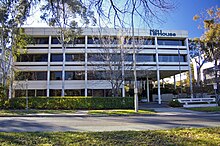|
National Farmers' Federation
The National Farmers' Federation (NFF) is an Australian non-profit membership–based organisation that represents farmers and the agricultural sector in Australia. The NFF has been a key player in a number of industrial relations disputes, including the 1998 waterfront dispute. As of June 2024[update] the president of the National Farmers' Federation is David Jochinke since 2023; the organisation's chief executive officer is Tony Mahar, since April 2016. HistoryThe NFF was formed in 1979.[citation needed] NFF was a key player in a number of industrial relations disputes, including the 1998 Australian waterfront dispute; the shearing wide comb dispute; and the Mudginberri dispute.[citation needed] Key policy prioritiesThe NFF's key policy areas include farm business and productivity; access to markets; digital connectivity; natural resource management; biosecurity, health and welfare; education and training; and workplace relations.[1] The NFF has been involved in a number of major policy debates in Australia, including most recently, the backpacker tax, the Murray-Darling Basin Plan, carbon tax, foreign investment, drought policy reform and livestock exports. In February 2013, the NFF released the first Blueprint for Australian Agriculture. The blueprint is a strategic plan for the Australian agricultural sector and its supply chain, setting out its future direction. The blueprint is the first cross-industry plan for the sector, developed by the sector. In 2013, the NFF moved into the legacy phase of the blueprint: turning the blueprint document into action. The blueprint was developed with the support of Westpac, Woolworths and the Department of Agriculture, Fisheries and Forestry, with Westpac and Woolworths continuing their support into the legacy phase, along with new partners Bayer and Syngenta Australia.[2] In December 2015, the National Farmers Federation launched a new program to use digital technology to improve agricultural efficiency. The program comprises three components:[3][4]
NFF membershipNFF policy is set by the NFF Members' Council, which comprises the presidents of the (as of 2016) NFF's 31–member organisations[6] NFF's members are the state-level farmers' organisations, national commodity councils, and other affiliated members. According to the NFF charter, state-level farmers' organisations represent the interests of the agricultural sector in their respective states. Issues related to individual commodities or interstate/national farming concerns are represented by relevant national commodity councils. The NFF focuses on those policy issues that affect all farmers, regardless of location or commodity. These include such issues as farm business and productivity, access to markets, natural resource management, biosecurity, animal health and welfare, education and training, and workplace relations.[7] In 2014 the NFF's 31–member organisations were:[8]
Office bearersPresidentThe following people have served as president of the National Farmers' Federation:
Chief executive officerThe following people have served as chief executive officer, or another appropriate title, of the National Farmers' Federation:
Award of HonourThe NFF Award of Honour recognises people who have made an important contribution to the NFF and the farming sector. These include:[13]
NFF CongressThe NFF has run its National Congress four times, in 2009, 2010, 2012 and 2014. The two first Congresses focused on modern farming, and adapting to the changing agriculture environment. In 2012, the Congress was around understanding, and capitalizing on, the food and fibre boom. The theme for the 2014 Congress was "Producing Our Future".[14] Australian Farmers' Fighting FundThe Australian Farmers' Fighting Fund was created in 1985 to provide financial, legal, and professional assistance to farmers. The fund was created out of the Mudgenberri dispute in 1985, funded in part by farmers and in part by non-farming businesses. The AFFF is governed independently of the NFF and is controlled by a board of trustees, three of whom are independent trustees.[citation needed] See alsoReferences
External links |
|||||||||||||||||||||||||||||||||||||||||||||||||||||||||||||||||||||||||||||||||||||||||||||||||||||||||||||||||||||||||||||||||||||||||||
